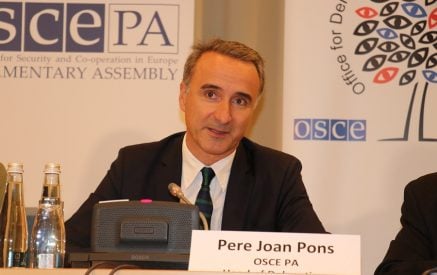“My country, my nation my people now need help,” today said Svetlana Tikhanovskaya, former Belarusian presidential candidate, addressing PACE Political Affairs Committee during an exchange of views on the situation in Belarus following the Presidential election.
“Peaceful protesters have been illegally detained, beaten and imprisoned. Oppositions figures are intimidated and threatened. Only yesterday one of the leaders of the peaceful protests was kidnapped. My husband is in jail, as are a hundred others. This should not be the norm in Europe. This cannot be the norm in a civilized world. I refuse, as millions of Belarusians do, to accept that this is the fate of my country, that the world will simply stand and watch these countless abuses of human rights, this blatant disregard of human dignity,” she said.
Ms Tikhanovskaya called for the immediate release of all political prisoners and the start of a civilised dialogue in order to find ways for the country to move forward. “It is well known that the official results of the Presidential election on 9 August were falsified. No international organisation recognised these false results. The Belarusian people certainly will not accept this fraud. This means that Mr Lukashenko does not have any legitimacy as the President of our country. He does not represent Belarus any more,” she added.
The former Belarusian presidential candidate said that it was symbolic that she was addressing the Parliamentary Assembly of the Council of Europe “as an outsider”, but added that this situation will not last long. “The Belarusians are now fighting for the values that this organisation defends. I very much hope that Belarus, the new Belarus, will very soon be able to retake its rightful place among other countries that respect human rights and dignity,” she underlined.
Read also
In response to the questions raised by committee members during the exchange of views, Ms Tikhanovskaya added that the majority of Belarus is ready for dialogue, but the Belarusian authorities are not. “Instead of dialogue they are intimidating, incriminating and forcing members of the Co-ordination Council to flee the country. This is not dialogue. This is repression,” she said.
According to the former Belarusian presidential candidate, “the Co-ordination Council, despite the repression, is still committed to dialogue. Thus there’s a fundamental question for PACE as well as other international institutions – how can you encourage dialogue, what are the instruments to enable it, if the authorities are simply ignoring the call for dialogue and are trying to eliminate the other side?”
“The Belarusian people want change. It is inevitable. People are determined to have change as well as dialogue, but it is in the hands of the authorities whether the dialogue begins, and whether the transition is peaceful,” she concluded.
Andrei Savinykh, Chairperson of the Standing Commission on International Affairs of the National Assembly of Belarus, also participated in the meeting, as well as PACE President Rik Daems, who recently called for “an all-inclusive national political process” in the country to ensure a peaceful and democratic transition.
Belarus applied to join the Council of Europe in 1993 but its parliament’s special guest status with the Assembly – regarded as the first step towards membership – was suspended in 1997. However since then the Assembly has continued to hold an ongoing dialogue with Belarusian authorities, parliamentarians and civil society, and frequently invites members of the National Assembly of Belarus, as well as members of the extra-parliamentary opposition, to attend meetings of its committees.
PACE























































